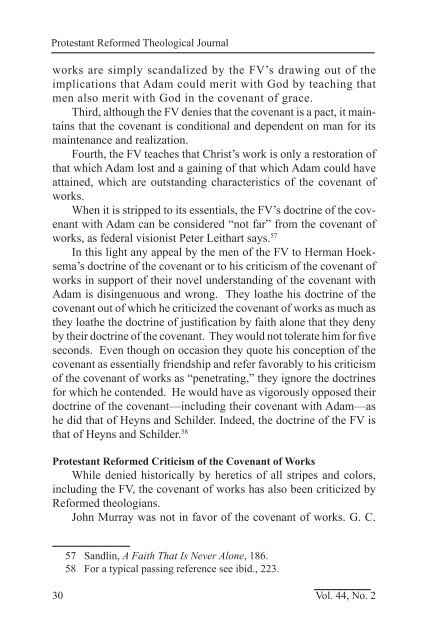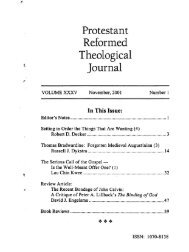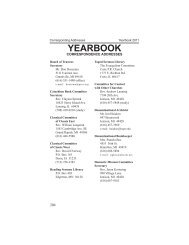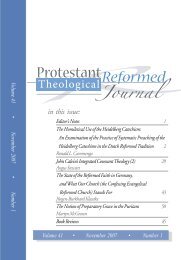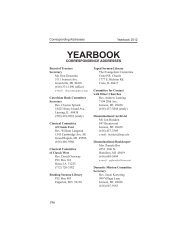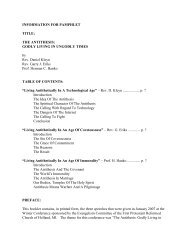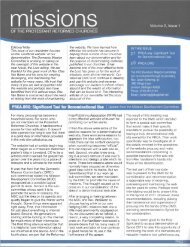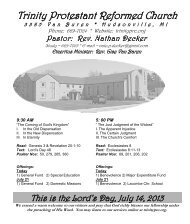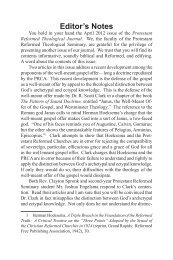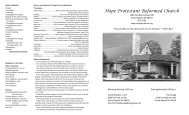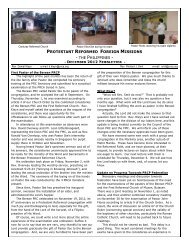A Critique of the Covenant of Works in Contemporary Controversy
A Critique of the Covenant of Works in Contemporary Controversy
A Critique of the Covenant of Works in Contemporary Controversy
Create successful ePaper yourself
Turn your PDF publications into a flip-book with our unique Google optimized e-Paper software.
Protestant Reformed Theological Journal<br />
works are simply scandalized by <strong>the</strong> FV’s draw<strong>in</strong>g out <strong>of</strong> <strong>the</strong><br />
implications that Adam could merit with God by teach<strong>in</strong>g that<br />
men also merit with God <strong>in</strong> <strong>the</strong> covenant <strong>of</strong> grace.<br />
Third, although <strong>the</strong> FV denies that <strong>the</strong> covenant is a pact, it ma<strong>in</strong>ta<strong>in</strong>s<br />
that <strong>the</strong> covenant is conditional and dependent on man for its<br />
ma<strong>in</strong>tenance and realization.<br />
Fourth, <strong>the</strong> FV teaches that Christ’s work is only a restoration <strong>of</strong><br />
that which Adam lost and a ga<strong>in</strong><strong>in</strong>g <strong>of</strong> that which Adam could have<br />
atta<strong>in</strong>ed, which are outstand<strong>in</strong>g characteristics <strong>of</strong> <strong>the</strong> covenant <strong>of</strong><br />
works.<br />
When it is stripped to its essentials, <strong>the</strong> FV’s doctr<strong>in</strong>e <strong>of</strong> <strong>the</strong> covenant<br />
with Adam can be considered “not far” from <strong>the</strong> covenant <strong>of</strong><br />
works, as federal visionist Peter Leithart says. 57<br />
In this light any appeal by <strong>the</strong> men <strong>of</strong> <strong>the</strong> FV to Herman Hoeksema’s<br />
doctr<strong>in</strong>e <strong>of</strong> <strong>the</strong> covenant or to his criticism <strong>of</strong> <strong>the</strong> covenant <strong>of</strong><br />
works <strong>in</strong> support <strong>of</strong> <strong>the</strong>ir novel understand<strong>in</strong>g <strong>of</strong> <strong>the</strong> covenant with<br />
Adam is dis<strong>in</strong>genuous and wrong. They loa<strong>the</strong> his doctr<strong>in</strong>e <strong>of</strong> <strong>the</strong><br />
covenant out <strong>of</strong> which he criticized <strong>the</strong> covenant <strong>of</strong> works as much as<br />
<strong>the</strong>y loa<strong>the</strong> <strong>the</strong> doctr<strong>in</strong>e <strong>of</strong> justification by faith alone that <strong>the</strong>y deny<br />
by <strong>the</strong>ir doctr<strong>in</strong>e <strong>of</strong> <strong>the</strong> covenant. They would not tolerate him for five<br />
seconds. Even though on occasion <strong>the</strong>y quote his conception <strong>of</strong> <strong>the</strong><br />
covenant as essentially friendship and refer favorably to his criticism<br />
<strong>of</strong> <strong>the</strong> covenant <strong>of</strong> works as “penetrat<strong>in</strong>g,” <strong>the</strong>y ignore <strong>the</strong> doctr<strong>in</strong>es<br />
for which he contended. He would have as vigorously opposed <strong>the</strong>ir<br />
doctr<strong>in</strong>e <strong>of</strong> <strong>the</strong> covenant—<strong>in</strong>clud<strong>in</strong>g <strong>the</strong>ir covenant with Adam—as<br />
he did that <strong>of</strong> Heyns and Schilder. Indeed, <strong>the</strong> doctr<strong>in</strong>e <strong>of</strong> <strong>the</strong> FV is<br />
that <strong>of</strong> Heyns and Schilder. 58<br />
Protestant Reformed Criticism <strong>of</strong> <strong>the</strong> <strong>Covenant</strong> <strong>of</strong> <strong>Works</strong><br />
While denied historically by heretics <strong>of</strong> all stripes and colors,<br />
<strong>in</strong>clud<strong>in</strong>g <strong>the</strong> FV, <strong>the</strong> covenant <strong>of</strong> works has also been criticized by<br />
Reformed <strong>the</strong>ologians.<br />
John Murray was not <strong>in</strong> favor <strong>of</strong> <strong>the</strong> covenant <strong>of</strong> works. G. C.<br />
57 Sandl<strong>in</strong>, A Faith That Is Never Alone, 186.<br />
58 For a typical pass<strong>in</strong>g reference see ibid., 223.<br />
30<br />
Vol. 44, No. 2


